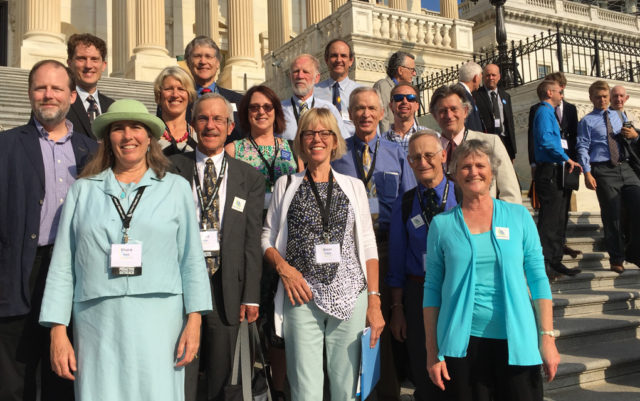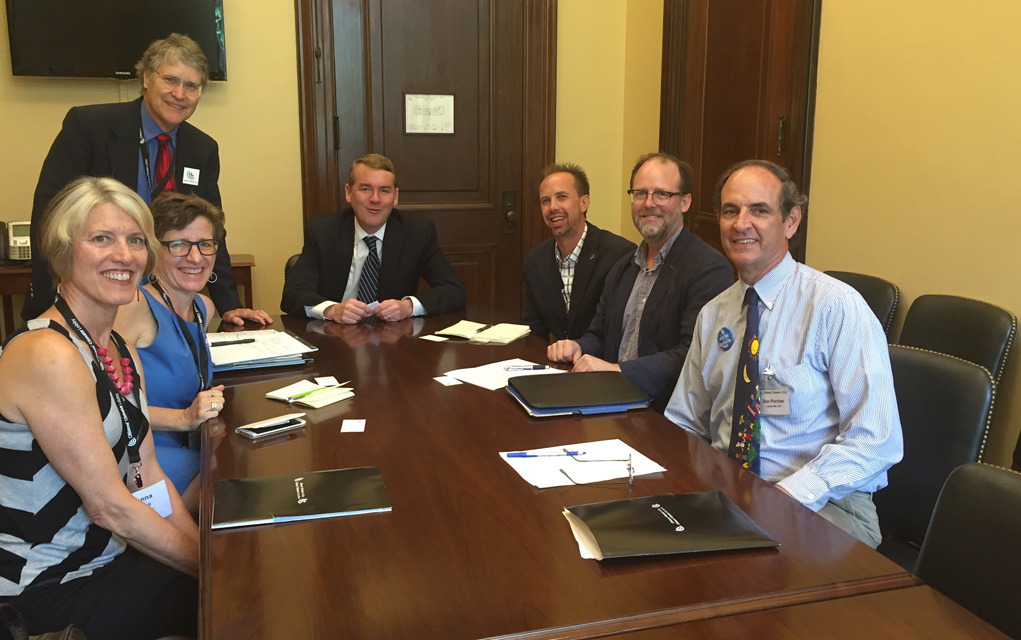
On Thursday June 21, 800 volunteer lobbyists, including 11 people from Boulder, spent all day on Capitol Hill in Washington D.C. asking their elected representatives to institute a national tax on carbon. As part of the fast-growing grassroots organization Citizens’ Climate Lobby (CCL), the volunteers met with 500 members of the House and Senate or their staff, roughly 90 percent of Congress.
“The single most important thing that needs to happen now is to get a national price on carbon,” says David Kline, volunteer outreach chair for the Boulder chapter and a retired energy policy analyst at the National Renewable Energy Lab.
The basic concept of the carbon tax policy is to reflect the “true cost” of burning fossil fuels by instituting an incremental carbon tax on producers over 20 years, which would incentivize the market to find other solutions to our energy needs. The tax would inevitably increase prices on a variety of commodities such as gasoline but to offset the increased cost to the consumer, the revenue from the carbon tax would be paid back to the American public through a dividend program separate from the federal budget.
“When you look at the distributional impact, when you have a carbon tax it’s harder on poor people than on rich people because they spend a bigger proportion of their income filling their gas tank and heating their house,” Kline says. “But the dividend is the other way around. It’s a bigger proportion to somebody at a lower income than a higher income.”
Based on the economic and carbon modeling, CCL member Jacob Corvidae, a manager at the Rocky Mountain Institute, argues the policy would accomplish more than the federal Clean Power Plan, which promises to reduce air pollutants 25 percent by the year 2030, and in a much shorter time frame.
“Unlike most other legislative responses to climate change, it is one that relies on strong market forces without growing the government. So this makes it more palatable to the Right, which is pretty necessary,” Corvidae says. “Both to pass it and to maintain it. The whole point is to make this a sustainable policy.”
Founded in 2007 by retired businessman Charles Saunders, CCL has upwards of 39,000 national members, with 340 active members and 1,300 registered supporters in Colorado. The organization has gained support from leading climate scientists such as James Hansen and endorsements from cities such as Philadelphia, San Francisco and Carbondale, as well as national organizations like the National Ski Area Association and a number of B-Corporations.
Saunders, after learning that Congress had renewed a law awarding $18 billion in subsidies to the oil and gas industry despite growing concern about climate change, knew he needed to change his strategy from local climate talks to national mobilization.
As an active volunteer lobbyist with the grassroots organization RESULTS, which has successfully built political consensus around initiatives to combat hunger and poverty, Saunders saw a lack of resources for people to learn how to talk to their elected representatives about climate change. So he applied the RESULTS model to CCL, with the idea of building long-term bipartisan relationships from the very beginning of the process.
“[We] use an approach that I actually find is so deeply grounded in good moral human relations and goes beyond most forms of activism,” Corvidae says. “I think for a lot of people, on the Left particularly, trust and respect is not how they enter the room if they are talking to a Republican congressman. It’s a transformatively different way to approach a negotiation.”
Kline and Corvidae were evasive when asked about specifics of the meetings in June, not wanting to out any specific members of Congress or staff who may be supportive of the policy across party lines. However, the group has seen notable progress, Kline says, including a number of bills in both the House and the Senate in 2015 that reflect elements of CCL’s carbon tax policy, although none passed. Also significant is New York Republican Rep. Chris Gibson’s 2015 Resolution on Climate Change, an acknowledgement by 12 Republican Representatives of the scientific evidence for human-caused climate change that falls short of legislative action but is seen as a step in the right direction.
And the Climate Solutions Caucus was introduced in February of 2016 by Reps. Ted Deutch (D) and Carlos Cuebelo (R) both from southern Florida. As a bipartisan task force dedicated to finding solutions in the House of Representatives, the Caucus is composed of pairs of representatives, one from each side of the aisle.
Part of CCL’s lobbying work includes matching Democrat and Republican Representatives to join the Caucus, and there are currently eight pairs or 16 members.

On the international front, CCL has been a major player in the World Bank’s Carbon Pricing Leadership Coalition, a group of government leaders, private sector companies and strategic partners committed to expanding the most effective carbon-tax policies throughout the global economy. Although the U.S. is not a partner in the effort, the coalition has a goal of implementing carbon pricing in every country in the world within the next five years.
“Without U.S. leadership we’re not going to have a global effort,” Kline says. “We live in the U.S. so what can we do? We can influence the U.S. side.”
The volunteer lobbyists have an uphill battle, however, as they compete with the oil and gas industry which has spent approximately $1.3 billion in lobbying efforts since 2007, according to the Center for Responsive Politics. But, Kline says, CCL has something the paid lobbyists will never have.
“There’s no doubt that congressmen need money, but they need money to get their constituents to vote for them. The money is in service to the constituents,” he says. “And so when you ask for a meeting with your representative, the answer is yes. They would be very poorly served if they did not sit down and listen respectfully.”
Skeptics may still question whether or not the carbon tax policy could actually work, but there is growing evidence to support such policies. In British Columbia for example, the government instituted a carbon tax in 2008. Since then, emissions have been cut by estimates of 5 to 15 percent and the government projects it will return dividends of approximately $1.7 billion Canadian dollars to households and businesses in 2016. A 2015 study conducted by economists at Duke University and the University of Ottawa found the tax has had “negligible effects on aggregate economic performance.” Other countries, such as Ireland, have reported similar successes.
After returning from D.C., Kline and Corvidae remain optimistic that the U.S. could pass similar legislation in the near future, aware that they aren’t likely to see any definitive action until after the current election cycle. Plus, the process itself gives Corvidae hope for the future of American democracy.
“It’s at the heart of how democracy is supposed to work. And I think most of us are pretty divorced from that, and that’s part of the root of despair that people feel about American politics,” Corvidae says. “For me it creates a tremendous amount of hope for the future to actually understand how accessible this process is and what it means to walk through it.”
There are currently 10 CCL chapters in five of the Colorado’s seven congressional districts with new ones in the process of organizing, including one in Longmont.














